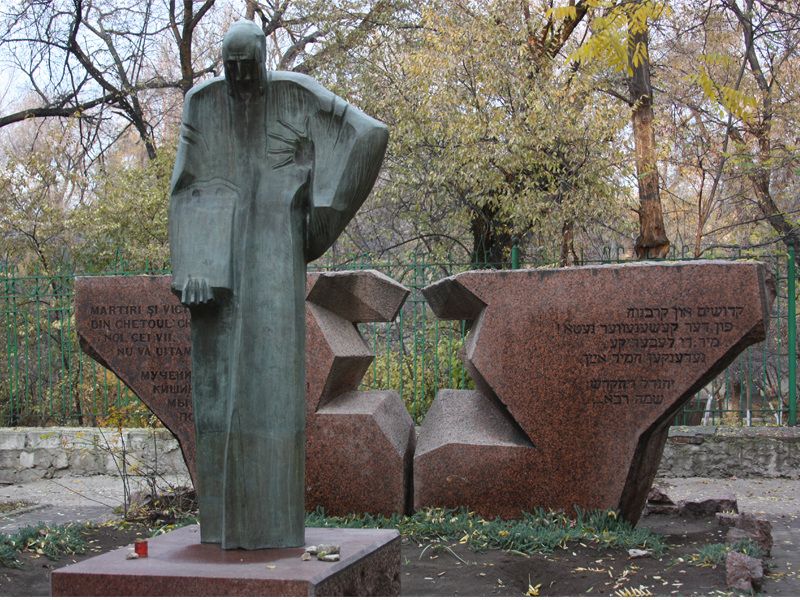 The breakup of the Soviet Union brought a rebirth of Jewish public life, but also revived an antisemitism that originated in the interwar period, rooted in nationalism. Moldovan Jews found themselves caught in the middle of the struggle between Russian and Moldovan ethnic groups. Because many of Moldova’s Jews did not speak Romanian (Moldova’s national language), but only Russian, they had to confront a pro-Romanian nationalist part of the population.
The breakup of the Soviet Union brought a rebirth of Jewish public life, but also revived an antisemitism that originated in the interwar period, rooted in nationalism. Moldovan Jews found themselves caught in the middle of the struggle between Russian and Moldovan ethnic groups. Because many of Moldova’s Jews did not speak Romanian (Moldova’s national language), but only Russian, they had to confront a pro-Romanian nationalist part of the population.
However, the Jews were wary of the presence of pro-Russian Cossack volunteer militias in Transnistria, many of whom were openly supportive of fascism and antisemitism. Cases of hate speech appeared in the media, while some extreme right newspapers blamed Jews for the previous communist regime and for the country’s economic difficulties. Leaflets placed in Chisinau mailboxes, and antisemitic graffiti by Romanian nationalists advised “Kikes and Russians to quit Moldova” or face retribution.
First government did not keep promises
Politically, the first independent government (1992-97) pledged to accommodate ethnic minorities, including Jews, in Moldovan society. But Jewish community leaders complained that some antisemitic acts have been classified as “petty hooliganism” or “common vandalism” by local authorities. In addition, several governments promises – such as to support the revival of Jewish culture and to reserve buildings for synagogues – have gone largely unfulfilled; the government claimed this was because of financial constraints facing the country. In general, Zalman Abelsky, the Jewish religious leader of Chisinau and Moldova for years, reported in 1996, that there was “little antisemitism” in Moldova and, despite his black hat and beard, signaling his Jewish-Lubavitch identity, he has had “few problems”.
Jewish community with strong ties to Israel and USA
In independent Moldova the Jewish community evolved into a vibrant society with strong connections with Moldovan Jewish Diaspora in Israel and USA. The Association of Jewish Organisations and Communities of Moldova and the Jewish Congress of Moldova united under their leadership such organisations as the Society of War Veterans, the Association of Jews – Prisoners of Ghetto and Concentration Camps, the “Hesed Yehuda” Welfare Center, the charity foundation “Dor le-Dor”, a women’s organisation. In Chişinău function two Jewish schools, a Jewish kindergarten, the Enlightenment University of Jewish Culture in Moldova, the Open University of Israel, Agudat Israel Yeshiva, a Jewish pedagogical women’s college, branches of international Hillel student’s club and the Maccabi movement, a theater of Jewish song and a Yiddish center. Besides, weekend schools were established in every city with a Jewish community. There are a dozen Jewish Chabad-Lubavitch communities in Moldova. The Jewish media is represented by TV programs and two Jewish newspapers: Evreiiskoe Mestechko (Jewish Shtetl) and Istoky (Roots). Due to the support of major sponsors from USA and Canada, on September 13, 2005 a Chişinău Jewish Campus opened to provide welfare, community and religious services to children, youth, middle-aged and elderly, under the same roof. Situated in the heart of the city and with a surface of 3,000 sq. m it became a major center for the members of Moldovan Jewish community.
Communists built Jewish monuments
Since the Communist Party came to power (2001), there has been a greater emphasis on legislation to protect minorities, including the Jewish people. The authorities also paid much more attention to building monuments at Holocaust sites and to victims of the Holocaust. With the contributions of Jewish organizations, associations of Holocaust survivors, and with the help of local administrations, monuments were erected in Chişinău, Bender, Orhei, Bălţi, Soroca, Tiraspol, Rîbniţa, and elsewhere.
Nevertheless, the Holocaust, as an event that occurred on Moldovan soil remains a controversial topic in Moldovan society. The majority of leading historians dispute the use of the term “Holocaust” to describe events that took place in Moldova under Romanian occupation. Further, while there are currently no political parties or periodicals espousing antisemitic agendas, incidents of antisemitism can be still be found. For example, nationalist activist Oleg Brega’s radio night talk show “Hyde Park” was closed in June 2003, accused of praising Hitler and Antonescu, inciting violence, and promoting xenophobia.
Currently, Moldova has no noticeable political parties whose programs or propaganda material would contain antisemitic ideas; neither does it have any periodicals of this sort. However, the lack of organized political antisemitism does not exclude the existence of individual antisemitism. Periodically acts of vandalism take place in the Jewish cemeteries of Chişinău, Tiraspol, Soroka, and others. In December 2009 the Jewish “Festival of Light” celebrations were disturbed in the centre of Chisinau when an Orthodox priest and his followers replaced a Jewish Hanukkiya by a wooden cross. In September 2010 the Great Moldovan Synagogue was vandalised with graffities that show swastikas and other antisemitic symbols.
Additional Information:
Diana Victor Dumitri is currently Associate Professor at the World History Department from State Pedagogical University of Moldova. She is writing her book about the relationship between Jews and gentiles in Bessarabia and Transnistria during 1941-1944. Moldovarious.com express their sincere gratitude for the right to publish excerpts from Mrs. Dumitri’s studies “The Jewish Community in Moldova since 1990”.

